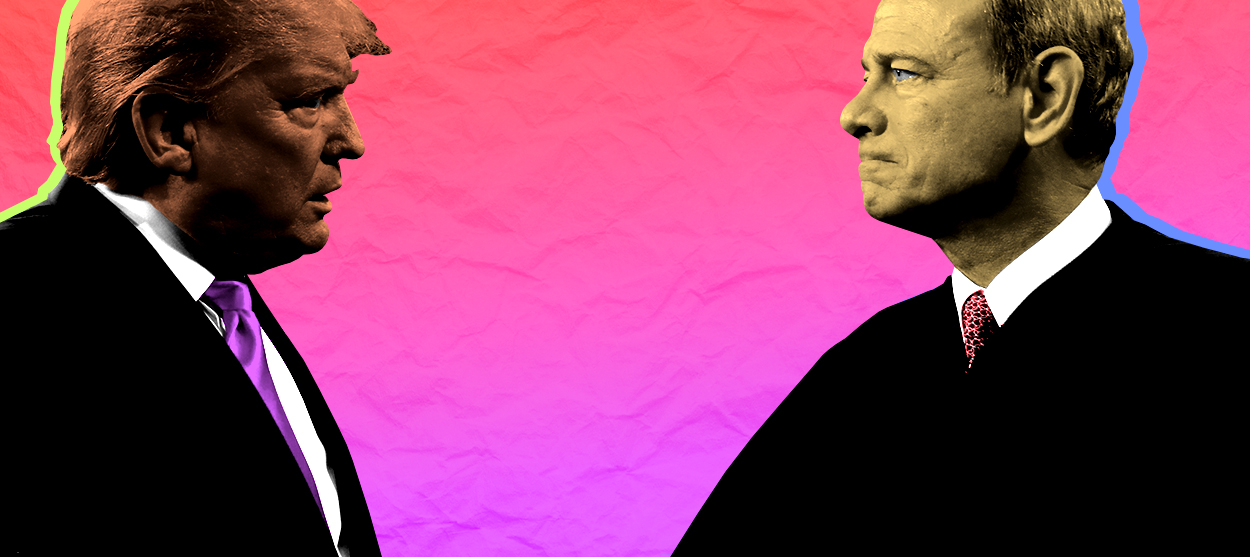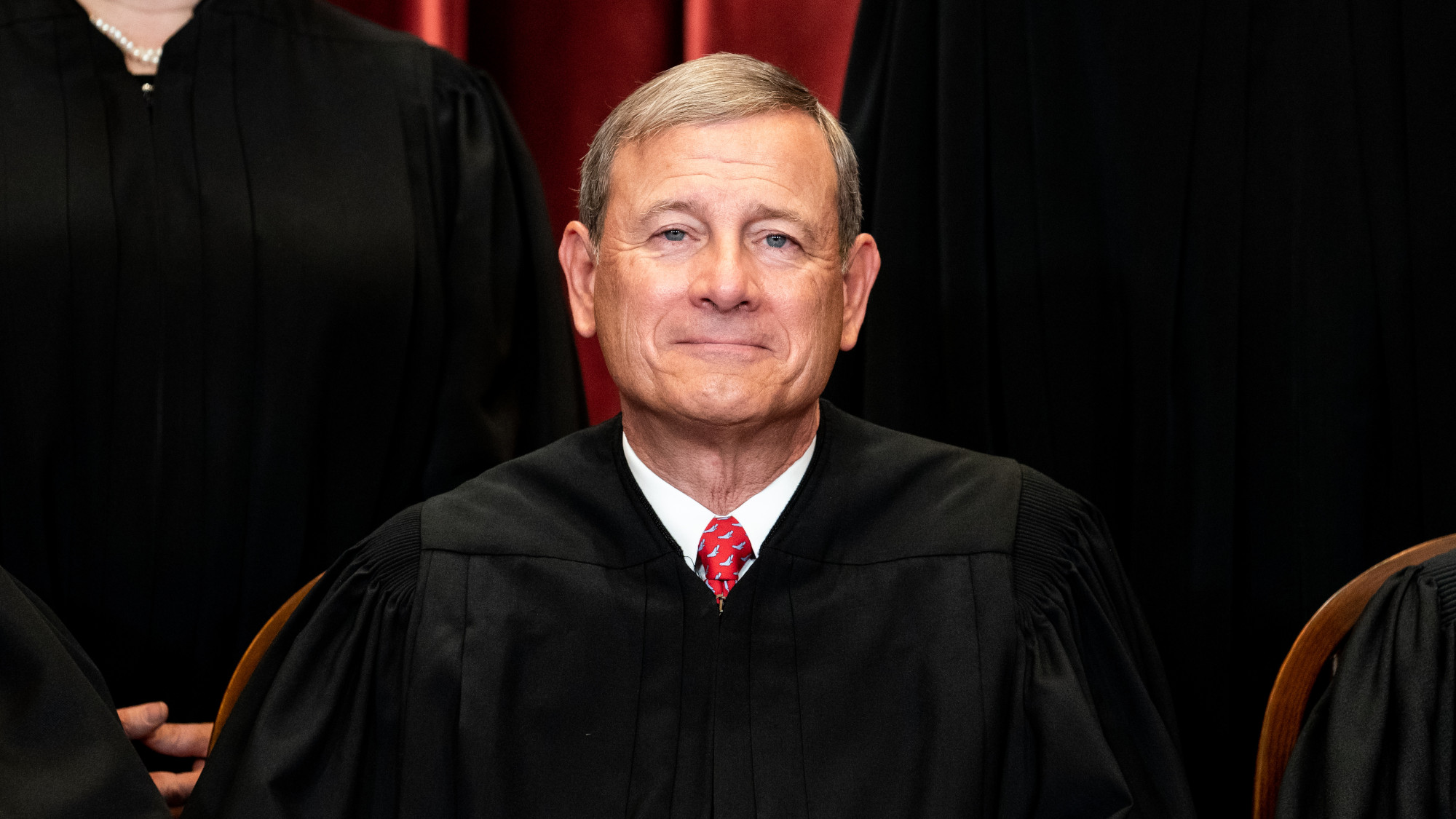John Roberts has had enough of Trump's bad faith
The DACA decision is more evidence of the Chief Justice's institutionalist principles


A free daily email with the biggest news stories of the day – and the best features from TheWeek.com
You are now subscribed
Your newsletter sign-up was successful
In joining with the Supreme Court's four liberal justices to block Trump administration plans to end the Deferred Action for Childhood Arrivals, or DACA, program (which was instituted by Barack Obama to protect immigrants brought to the United States as children from being deported), Chief Justice John Roberts has shown that he's had quite enough of the mendaciousness that marks so much of what the Trump administration has tried to do over the past three years.
As The Atlantic's Adam Serwer pointed out in a perspicacious tweet shortly after the 5-4 ruling was announced, Roberts' "very dim view of the Trump administration's bad faith" goes back to the census case, Department of Commerce v. New York, from the Supreme Court's last term. That's when the court was asked to rule on whether the administration could add a citizenship question to the 2020 census.
The plaintiffs in that case, as Slate's Mark Joseph Stern explained in his book American Justice 2019: The Roberts Court Arrives (which I had a hand in publishing), uncovered convincing evidence that "the true purpose of the citizenship question was to favor white Republican voters" (by discouraging undocumented immigrants from completing the census, thereby lowering population numbers, representation, and federal funding for areas of the country with greater numbers of immigrants, which tend to vote for Democrats). But when Commerce Secretary Wilbur Ross announced his rationale for adding the census question, he justified it in terms of a need for the government to do a better job of enforcing the Voting Rights Act (VRA). What the plaintiffs in the Supreme Court case later discovered is that this rationale was pretextual — deliberately concocted by a Justice Department lawyer after then-Attorney General Jeff Sessions asked him to work with the Commerce Department to do precisely that.
The Week
Escape your echo chamber. Get the facts behind the news, plus analysis from multiple perspectives.

Sign up for The Week's Free Newsletters
From our morning news briefing to a weekly Good News Newsletter, get the best of The Week delivered directly to your inbox.
From our morning news briefing to a weekly Good News Newsletter, get the best of The Week delivered directly to your inbox.
Ross knew very well that the question was being added to advantage Republicans, but he devised a deception to conceal it.
On substance, Roberts had no objection to the Trump administration adding a citizenship question to the census. Interestingly, the bulk of his majority opinion joining with the high court's four liberal justices in blocking the question read like it was written to justify siding with the court's four conservatives in permitting the question. Yet in the last section of the opinion, Robert changed tack, writing that government agencies must "disclose the basis" of their actions and not engage in post hoc rationalizations to justify them. Judged by that standard, the government had failed in this case.
As Roberts wrote at the conclusion of his opinion,
Altogether, the evidence tells a story that does not match the Secretary's explanation for his decision. Unlike a typical case in which an agency may have both stated and unstated reasons for a decision, here the VRA enforcement rationale — the sole stated reason — seems to have been contrived. The reasoned explanation requirement of administrative law is meant to ensure that agencies offer genuine justifications for important decisions, reasons that can be scrutinized by courts and the interested public. The explanation provided here was more of a distraction.
Roberts' majority opinion in the DACA case (Department of Homeland Security v. Regents of University of California) takes a similar line. Roberts doesn't claim that DACA can't be rescinded. (Only Justice Sonia Sotomayor was persuaded that doing so would violate the Equal Protection Clause of the Constitution.) Instead, Roberts sides with U.S. District Judge John D. Bates in ruling that the administration's original justification for the move (in a sloppy one-page memo by Sessions) was "arbitrary and capricious" under the Administrative Procedure Act (APA). He also labels arguments contained in a memo authored months later by Homeland Security secretary Kirstjen Nielsen "post hoc rationalizations."
A free daily email with the biggest news stories of the day – and the best features from TheWeek.com
This doesn't make Roberts a born-again partisan liberal. It makes him a defender of the rule of law and an institutionalist. How the federal government acts matters almost as much as, and sometimes more than, what it does. Laws, rules, and norms need to be followed. Decisions need to be explained and justified in ways that make sense. They can't be arbitrary, capricious, or motivated by outright animus. And justifications can't be fabricated after the fact in order to conceal the true motives of government officials. It doesn't matter if the cause of such rationalizations is outright deception, as it was in the census case, or carelessness, as it likely was in the DACA case.
What the DACA decision also shows is that Roberts is alone among the court's conservatives in caring about such issues. Justices Clarence Thomas, Samuel Alito, Neil Gorsuch, and Bret Kavanaugh all dissented in the DACA case, with the first three arguing that the Obama rule had always been illegal and Kavanaugh explicitly dismissing the majority's concern with the APA's "arbitrary and capricious" standard, denying its relevancy to the attempted rescission.
But the chief justice has other concerns, among them the need to uphold certain procedural standards across the federal government. Presidents and their appointees can't simply do anything they want, even when the aim falls within their purview. They need to abide by the rule of law in taking action. That leaves open the possibility of the Trump administration trying again in a more cautious and careful way. If the administration does that, Roberts may well sign off on a rescission of DACA.
The demand that it be done by the book is not nothing. In fact, it's what separates a nation governed by law from one ruled by the whims of a malicious despot and his obsequious enablers. We should be grateful that John Roberts understands the difference.
Want more essential commentary and analysis like this delivered straight to your inbox? Sign up for The Week's "Today's best articles" newsletter here.
Damon Linker is a senior correspondent at TheWeek.com. He is also a former contributing editor at The New Republic and the author of The Theocons and The Religious Test.
-
 6 of the world’s most accessible destinations
6 of the world’s most accessible destinationsThe Week Recommends Experience all of Berlin, Singapore and Sydney
-
 How the FCC’s ‘equal time’ rule works
How the FCC’s ‘equal time’ rule worksIn the Spotlight The law is at the heart of the Colbert-CBS conflict
-
 What is the endgame in the DHS shutdown?
What is the endgame in the DHS shutdown?Today’s Big Question Democrats want to rein in ICE’s immigration crackdown
-
 The billionaires’ wealth tax: a catastrophe for California?
The billionaires’ wealth tax: a catastrophe for California?Talking Point Peter Thiel and Larry Page preparing to change state residency
-
 How robust is the rule of law in the US?
How robust is the rule of law in the US?TODAY’S BIG QUESTION John Roberts says the Constitution is ‘unshaken,’ but tensions loom at the Supreme Court
-
 Bari Weiss’ ‘60 Minutes’ scandal is about more than one report
Bari Weiss’ ‘60 Minutes’ scandal is about more than one reportIN THE SPOTLIGHT By blocking an approved segment on a controversial prison holding US deportees in El Salvador, the editor-in-chief of CBS News has become the main story
-
 Has Zohran Mamdani shown the Democrats how to win again?
Has Zohran Mamdani shown the Democrats how to win again?Today’s Big Question New York City mayoral election touted as victory for left-wing populists but moderate centrist wins elsewhere present more complex path for Democratic Party
-
 Millions turn out for anti-Trump ‘No Kings’ rallies
Millions turn out for anti-Trump ‘No Kings’ ralliesSpeed Read An estimated 7 million people participated, 2 million more than at the first ‘No Kings’ protest in June
-
 Supreme Court: Judging 20 years of Roberts
Supreme Court: Judging 20 years of RobertsFeature Two decades after promising to “call balls and strikes,” Chief Justice John Roberts faces scrutiny for reshaping American democracy
-
 Ghislaine Maxwell: angling for a Trump pardon
Ghislaine Maxwell: angling for a Trump pardonTalking Point Convicted sex trafficker's testimony could shed new light on president's links to Jeffrey Epstein
-
 The last words and final moments of 40 presidents
The last words and final moments of 40 presidentsThe Explainer Some are eloquent quotes worthy of the holders of the highest office in the nation, and others... aren't
